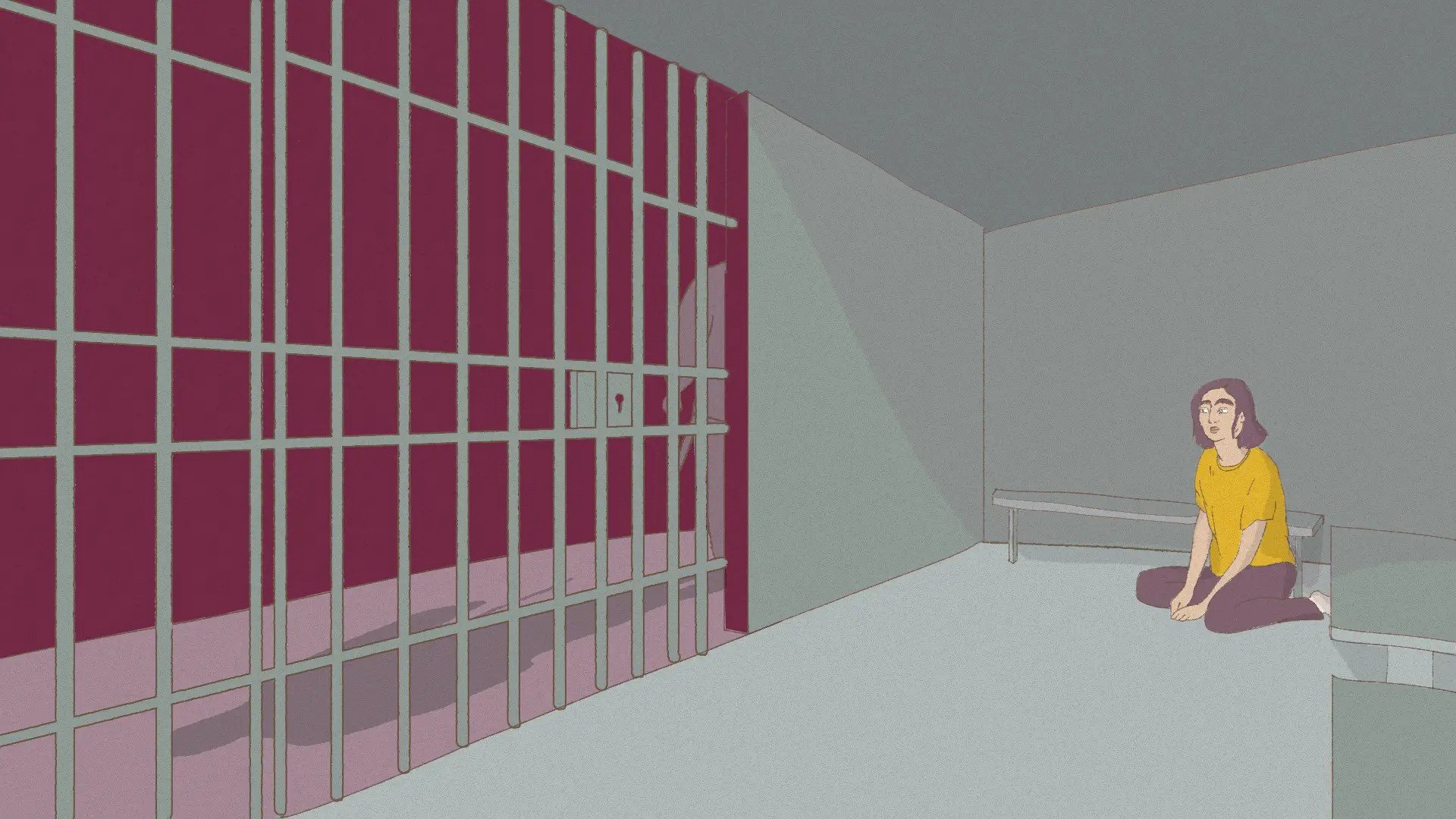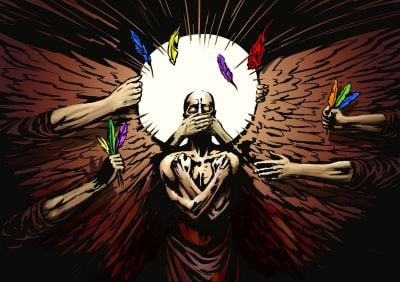
Image from the HRW report, 2023. (Credit: Christina Atik/Human Rights Watch)
BEIRUT – On New Year's Eve of 2021, Joanna, a 27-year-old transgender woman, was arrested by police officers in Beirut.
“As soon as they got me in the car, they snatched my phone and forced me to open it. They went directly to my photo gallery, took screenshots of my photos dressed as a woman, then sent the screenshots to themselves.”
Joanna’s experience was one of many documented by the advocacy group Human Rights Watch (HRW) in their latest report: ‘All This Terror Because of a Photo’: Digital Targeting and Its Offline Consequences for LGBT People in the Middle East and North Africa.'
Released Tuesday at Dar al-Nimr, a gallery and cultural center in Beirut, the scathing report details how Arab governments across the region, including Lebanon, use social media to both entrap and extort LGTBQ+ individuals. The report focuses on five Arab countries – Egypt, Iraq, Jordan, Lebanon, and Tunisia — and calls on those governments to backtrack such measures. It also asks digital platforms to invest in more content monitoring techniques.
An unfair legal system
“The targeting of LGBT people online is enabled by their legal precarity offline,” the report said. This includes laws that criminalize the sexual activity of individuals of the same sex and vague laws that cite “debauchery.”
Although not explicitly illegal in Lebanon, Article 534 of the penal code is often used to criminalize non-heteronormative relationships.
Article 534 “prohibits any sexual intercourse that contradicts the law of nature,” and is punishable by a prison sentence of up to one year.
As was previously reported by L’Orient Today, members of the LGBTQ+ community are oftentimes targeted by authorities and experiences of extortion and harassment are not uncommon.
The HRW report notes that other cryptic articles of Lebanon’s penal code can be used to target queer individuals. Article 521 — which criminalizes “every man who masquerades as a woman to enter women’s spaces,” is often used by police to target transwomen “due to the mismatch between their official documents and their gender identity and expression.” Articles 531, 532 and 533, which relate to “public morality” have been used to shut down LGBTQ+ human rights events in the past.
During Pride Month in June, caretaker Interior Minister Bassam Mawlawi issued a decree instructing security forces to shut down any LGBTQ+-related events. The State Shura Council later overruled his decision, but this did not stop Mawlawi from issuing a similar decree in November.
Extortion cases by security forces
According to the report, security officials in all countries illegally search the devices of queer people without a warrant to collect private information, which they later use to prosecute them.
In all five countries, LGBTQ+ individuals shared experiences of being forced to unlock their phones. In many cases, photos, text messages, and dating applications were used by authorities as “evidence” to prosecute them.
In Lebanon, the report documented the case of Chaker, a gay Syrian man who was first detained at Hobish station on Bliss Street and later in Roumieh prison for four months in 2017. Information forcibly taken from his phone was used to press charges against him.
In cases where police could not find cause for guilt, they set up “sting operations” whereby members of the police force downloaded same-sex dating apps and initiated chats “on their phones, uploaded photos, and fabricated chats to justify the detention [of LGBTQ+ people].”
 Image from the HRW report, 2023. (Credit: Christina Atik/Human Rights Watch)
Image from the HRW report, 2023. (Credit: Christina Atik/Human Rights Watch)
Extortions by private individuals
The report noted that it was not just security officials doing the targeting but ordinary citizens as well. One example cited was that of Shirine, a Lebanese transgender woman who was detained in 2021, after a man she met online filed a police report against her.
Most extortion cases documented by HRW were orchestrated by people that impersonated LGBTQ+ individuals and threatened to out them by “publishing personally identifiable information” about the victim “on public social media platforms.” Other cases on the report involved, death threats made by armed groups online. In some cases, LGBTQ+ individuals were targeted for their activism.
The report noted the isolation experienced by targeted individuals “months and even years after the instance of targeting, as well as their constant fear, post-traumatic stress, depression, and anxiety.”
Shrine told HRW that she attempted suicide six times after the horrific experience.
“I am also suffering mentally and I take prescription pills for that.”
Chaker told HRW that after calling his parents from inside detention and describing what happened he began to receive threats from them.
“I suffered mentally and psychologically from that incident and I have feelings of hopelessness and anguish.”
Unresponsive platforms and governments
When targeted individuals tried to report the abuse to the digital media platforms on which the harassment occurred, the platforms cited that the hurtful posts did not violate their guidelines and did nothing to remove them.
Besides their active involvement in the abuse, the respective governments mentioned in the report have done nothing to prosecute online harassers.
Most of the LGBTQ+ individuals interviewed said they would not report cyber harassment to authorities, out of fear of victim-blaming or not being taken seriously. The report documented six cases of individuals who reported being extorted to the authorities, only to end up getting arrested themselves.
The report called on governments to pass laws that ensure the safety of LGBTQ+ individuals. It called on Lebanon to repeal Article 534 of the penal code and recommended the passing of an anti-discrimination law that bans “discrimination, including online, on the grounds of sex, gender, gender identity, and sexual orientation and includes effective measures to identify and address such discrimination.” It also called on authorities to respect article 47 Code of Criminal Procedure which caps detentions without a charge to 48 hours, which “is often violated in practice.”
Additionally, it called on digital platforms such as Instagram, Grindr and Twitter to prevent online abuse and to “prevent online spaces from becoming tools of state repression. ” It stated that the platforms “are failing to protect users vulnerable to digital targeting.” The report recommended more content moderation (specifically in the Arabic language) and the removal of content that puts LGBTQ+ people at risk.
Three-quarters of the 120 interviews featured in the report were with the affected population. The remaining interviews featured experts “including lawyers and digital rights professionals.” The Coalition for Digital and LGBT rights, made up of local LGBTQ+ groups in the five respective countries, contributed to the research of the report.
“All This Terror Because of a Photo’: Digital Targeting and Its Offline Consequences for LGBT People in the Middle East and North Africa” is available at:
https://www.hrw.org/node/384065

